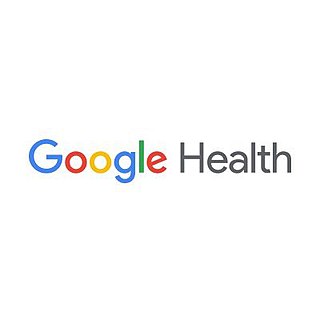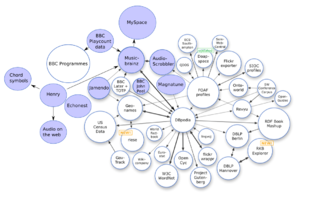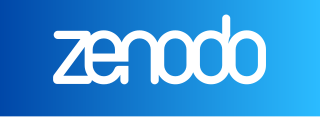Center for Democracy & Technology (CDT) is a Washington, D.C.–based 501(c)(3) nonprofit organisation that advocates for digital rights and freedom of expression. CDT seeks to promote legislation that enables individuals to use the internet for purposes of well-intent, while at the same time reducing its potential for harm. It advocates for transparency, accountability, and limiting the collection of personal information.
Media democracy is a democratic approach to media studies that advocates for the reform of mass media to strengthen public service broadcasting and develop participation in alternative media and citizen journalism in order to create a mass media system that informs and empowers all members of society and enhances democratic values.

Google Health was a project by Google designed as an attempt to create a repository of health records and data in order to connect doctors, hospitals and pharmacies directly. The project was introduced in 2008 and discontinued in 2012. Google Health was restarted in 2018 but appeared to be discontinued in 2021 and was officially called an "effort" rather than a separate division as of 2022.

Project MUSE, a non-profit collaboration between libraries and publishers, is an online database of peer-reviewed academic journals and electronic books. Project MUSE contains digital humanities and social science content from over 250 university presses and scholarly societies around the world. It is an aggregator of digital versions of academic journals, all of which are free of digital rights management (DRM). It operates as a third-party acquisition service like EBSCO, JSTOR, OverDrive, and ProQuest.

Facebook is an online social media and social networking service owned by American technology giant Meta Platforms. Created in 2004 by Mark Zuckerberg with fellow Harvard College students and roommates Eduardo Saverin, Andrew McCollum, Dustin Moskovitz, and Chris Hughes, its name derives from the face book directories often given to American university students. Membership was initially limited to only Harvard students, gradually expanding to other North American universities and, since 2006, anyone over 13 years old. As of December 2022, Facebook claimed 3 billion monthly active users, and ranked third worldwide among the most visited websites. It was the most downloaded mobile app of the 2010s.

Open data is data that is openly accessible, exploitable, editable and shared by anyone for any purpose. Open data is licensed under an open license.
Research data archiving is the long-term storage of scholarly research data, including the natural sciences, social sciences, and life sciences. The various academic journals have differing policies regarding how much of their data and methods researchers are required to store in a public archive, and what is actually archived varies widely between different disciplines. Similarly, the major grant-giving institutions have varying attitudes towards public archival of data. In general, the tradition of science has been for publications to contain sufficient information to allow fellow researchers to replicate and therefore test the research. In recent years this approach has become increasingly strained as research in some areas depends on large datasets which cannot easily be replicated independently.
The Institute for Information Infrastructure Protection (I3P) is a consortium of national cyber security institutions, including academic research centers, U.S. federal government laboratories, and nonprofit organizations, all of which have long-standing, widely recognized expertise in cyber security research and development (R&D). The I3P is managed by The George Washington University, which is home to a small administrative staff that oversees and helps direct consortium activities.

Marc Rotenberg is president and founder of the Center for AI and Digital Policy, an independent non-profit organization, incorporated in Washington, D.C. Rotenberg is the editor of The AI Policy Sourcebook, a member of the OECD Expert Group on AI, and helped draft the Universal Guidelines for AI. He teaches the GDPR and privacy law at Georgetown Law and is coauthor of Privacy Law and Society and The Privacy Law Sourcebook (2020). Rotenberg is a founding board member and former chair of the Public Interest Registry, which manages the .ORG domain.
Open data in Canada describes the capacity for the Canadian Federal Government and other levels of government in Canada to provide online access to data collected and created by governments in a standards-compliant Web 2.0 way. Open data requires that machine-readable should be made openly available, simple to access, and convenient to reuse. As of 2016, Canada was ranked 2nd in the world for publishing open data by the World Wide Web Foundation's Open Data Barometer.

The University of Michigan Institute for Social Research (ISR) is the largest academic social research and survey organization in the world, established in 1949. ISR includes more than 300 scientists from a variety of academic disciplines – including political science, psychology, sociology, economics, demography, history, anthropology, and statistics. The institute is a unit that houses five separate but interdependent centers which conduct research and maintain data archives. In 2021, Kathleen Cagney became the first woman in its history to be named Director of the institute.
The Open Commons Consortium is a 501(c)(3) non-profit venture which provides cloud computing and data commons resources to support "scientific, environmental, medical and health care research." OCC manages and operates resources including the Open Science Data Cloud, which is a multi-petabyte scientific data sharing resource. The consortium is based in Chicago, Illinois, and is managed by the 501(c)3 Center for Computational Science Research.

The Eastern Academic Research Consortium, or "Eastern Arc", is a regional research collaboration between the University of East Anglia, the University of Essex, and the University of Kent. The three partner institutions are all part of the "plate glass universities" established in the 1960s.
The 100,000 Genomes Project is a now-completed UK Government project managed by Genomics England that is sequencing whole genomes from National Health Service patients. The project is focusing on rare diseases, some common types of cancer, and infectious diseases. Participants give consent for their genome data to be linked to information about their medical condition and health records. The medical and genomic data is shared with researchers to improve knowledge of the causes, treatment, and care of diseases.

Zenodo is a general-purpose open repository developed under the European OpenAIRE program and operated by CERN. It allows researchers to deposit research papers, data sets, research software, reports, and any other research related digital artefacts. For each submission, a persistent digital object identifier (DOI) is minted, which makes the stored items easily citeable.
The Electoral Integrity Project is an academic project based at Royal Military College of Canada and the University of East Anglia which seeks to quantify the integrity of elections worldwide. The project freely publishes its Perceptions of Electoral Integrity dataset for scholarly use. It also organises international conferences and workshops. The most recent data and report release, Electoral Integrity Global Report, covers 480 elections in 169 countries from mid 2012 to the end of 2021. It is directed by Holly Ann Garnett and Toby S. James. It was founded by Pippa Norris.

The Comparative Study of Electoral Systems (CSES) is a collaborative research project among national election studies around the world. Participating countries and polities include a common module of survey questions in their national post-election studies. The resulting data are collated together along with voting, demographic, district and macro variables into one dataset allowing comparative analysis of voting behavior from a multilevel perspective.
In the 2010s, personal data belonging to millions of Facebook users was collected without their consent by British consulting firm Cambridge Analytica, predominantly to be used for political advertising.
Data collaboratives are a form of collaboration in which participants from different sectors—including private companies, research institutions, and government agencies—can exchange data and data expertise to help solve public problems.








